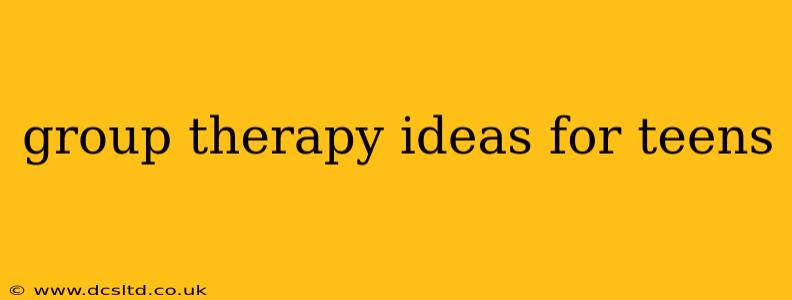Teenage years are a rollercoaster of emotions, social pressures, and identity exploration. Group therapy provides a safe and supportive space for teens to navigate these challenges, learn coping mechanisms, and build crucial social skills. This article explores innovative and effective group therapy ideas specifically designed for the unique needs of adolescents.
What are the Benefits of Group Therapy for Teens?
Before diving into specific activities, let's understand why group therapy is so beneficial for teenagers. It offers a unique blend of:
- Normalization: Teens often feel isolated in their struggles. Group therapy demonstrates that their experiences are shared, reducing feelings of shame and loneliness.
- Social Skills Development: The group setting provides opportunities to practice communication, empathy, conflict resolution, and social interaction in a low-stakes environment.
- Improved Self-Esteem: Sharing experiences and receiving support from peers builds confidence and fosters a sense of belonging.
- Enhanced Coping Mechanisms: Teens learn from each other's coping strategies and develop a wider range of tools to manage stress, anxiety, and other challenges.
- Increased Self-Awareness: Through interaction and feedback, teens gain valuable insights into their thoughts, feelings, and behaviors.
Group Therapy Activities for Teens: A Diverse Approach
The success of teen group therapy relies on a diverse range of activities that cater to different learning styles and personality types. Here are some engaging ideas:
1. Creative Expression:
- Journaling Prompts: Themed journaling prompts can encourage self-reflection and emotional processing. Examples: "What is one thing I'm grateful for today?", "What is one challenge I'm facing, and how can I approach it differently?"
- Art Therapy: Using art materials like paint, clay, or collage to express emotions non-verbally can be particularly helpful for teens who struggle with verbal communication.
- Music Therapy: Listening to or creating music can be a powerful tool for emotional regulation and self-expression.
2. Role-Playing and Simulations:
- Social Situation Role-Playing: Practicing challenging social situations, like assertiveness training or conflict resolution, in a safe and controlled environment.
- Empathy Exercises: Activities designed to help teens understand and appreciate different perspectives. This could involve scenarios where they step into someone else's shoes and consider their feelings.
3. Games and Activities:
- Trust-Building Games: Icebreaker games and trust exercises can help teens connect and build rapport with each other.
- Cooperative Games: These foster teamwork and collaboration, teaching teens the importance of working together to achieve a common goal.
4. Mindfulness and Relaxation Techniques:
- Guided Meditation: Teaching teens mindfulness techniques to manage stress and anxiety.
- Deep Breathing Exercises: Simple breathing exercises can help teens calm down in moments of distress.
5. Educational Workshops:
- Stress Management Workshops: Providing teens with practical strategies for managing stress, such as time management, healthy lifestyle choices, and relaxation techniques.
- Communication Skills Workshops: Improving communication skills through active listening, assertive communication, and non-violent conflict resolution.
Addressing Specific Challenges in Teen Group Therapy
Teenagers face various challenges, and group therapy can address these directly:
How to Deal with Social Anxiety in Group Therapy?
Social anxiety is a common concern. Start with icebreakers, create a supportive environment emphasizing confidentiality and respect, and gradually increase interaction levels.
How Can Group Therapy Help with Depression and Anxiety in Teens?
Group therapy provides a supportive environment where teens can share their experiences, learn coping strategies, and develop a sense of belonging. Cognitive Behavioral Therapy (CBT) techniques can be incorporated to challenge negative thought patterns and build resilience.
How Can Group Therapy Help Teens with Anger Management Issues?
Anger management techniques such as identifying triggers, practicing relaxation techniques, and developing assertive communication skills can be effectively addressed in a group setting. Role-playing scenarios can help teens practice managing their anger in different situations.
Conclusion: A Powerful Tool for Adolescent Growth
Group therapy offers a unique opportunity for teens to connect with peers, learn valuable coping skills, and develop a stronger sense of self. By incorporating diverse activities and addressing specific challenges, therapists can create a powerful and positive therapeutic experience that empowers adolescents to thrive. Remember to always prioritize a safe, supportive, and confidential environment.
